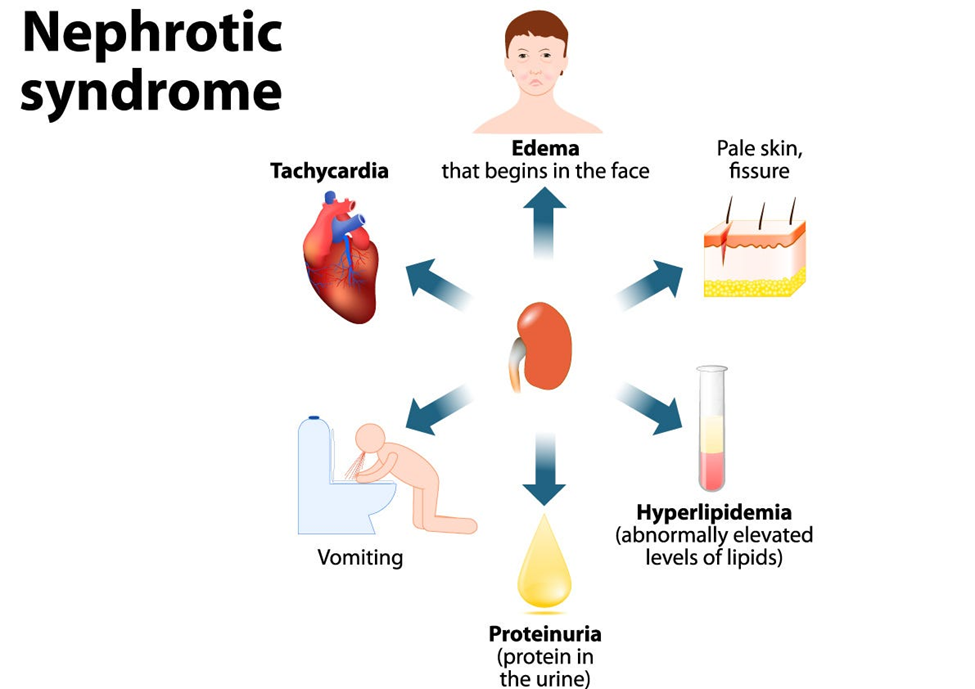A nurse is collecting data from a child who has nephrotic syndrome. Which of the following manifestations should the nurse expect?
Orange-tinged urine
Hypertension
Periorbital edema
Polyuria
The Correct Answer is C
A. Orange-tinged urine
- This manifestation is not typically associated with nephrotic syndrome. Orange-tinged urine may indicate other conditions such as dehydration, liver disease, or the presence of certain medications or foods.
B. Hypertension
- Hypertension is not a common manifestation of nephrotic syndrome. However, it can occur in some cases due to the retention of sodium and water, which can lead to fluid overload and increased blood pressure.
C. Periorbital edema
- This is a classic manifestation of nephrotic syndrome. Periorbital edema, or swelling around the eyes, is often one of the initial signs observed in children with nephrotic syndrome due to the loss of protein in the urine, leading to fluid accumulation in the tissues.
D. Polyuria
- Polyuria, or increased urine output, is not typically associated with nephrotic syndrome. Instead, children with nephrotic syndrome may experience oliguria or normal urine output, depending on the severity of renal involvement and fluid balance.

Nursing Test Bank
Naxlex Comprehensive Predictor Exams
Related Questions
Correct Answer is B
Explanation
A. Allowing siblings to visit the client in the hospital
- Allowing siblings to visit the client in the hospital is a compassionate gesture and promotes family-centered care. However, it may not directly address the concept of atraumatic care, which focuses on minimizing physical and psychological stress related to healthcare procedures.
B. Using a doll to demonstrate an invasive procedure
- Using a doll to demonstrate an invasive procedure is an example of atraumatic care. It allows the nurse to provide preparatory information to the child in a non-threatening and understandable manner. By visually demonstrating the procedure on a doll, the child can better understand what will happen, reducing anxiety and fear.
C. Encouraging communication between the parents and nurse
- Encouraging communication between the parents and nurse is important for providing holistic care and addressing the child's needs. While effective communication is essential, it may not directly demonstrate the concept of atraumatic care unless it involves discussing how to minimize stress and anxiety during procedures.
D. Arranging the room to accommodate religious practices
- Arranging the room to accommodate religious practices is a form of patient-centered care and respects the cultural and religious beliefs of the patient and family. While important for overall comfort and respect for the patient's values, it may not directly relate to the concept of atraumatic care, which specifically focuses on reducing stress and anxiety during healthcare procedures.
Correct Answer is D
Explanation
A. Patches of baldness: Patches of baldness on the scalp could be indicative of conditions like alopecia areata, a disorder characterized by hair loss in patches. However, it is not a typical manifestation of pediculosis capitis, which primarily presents with scalp itchiness due to lice bites rather than hair loss.
B. Blisters on the scalp: Blisters on the scalp may suggest other conditions such as herpes simplex infection or contact dermatitis. While scratching from head lice infestation could lead to skin irritation, blisters are not a common presentation of pediculosis capitis.
C. Dry patches on the scalp: Dry patches on the scalp might be caused by conditions like seborrheic dermatitis or eczema. While scalp dryness can occur with pediculosis capitis due to irritation from scratching, it is not a specific symptom associated with head lice infestation.
D. Reports of scalp itchiness: Scalp itchiness is a hallmark symptom of pediculosis capitis. It occurs as a result of lice bites and the body's inflammatory response to their saliva. It is the most characteristic and common manifestation of head lice infestation and often prompts further examination for the presence of lice or their eggs (nits).
Whether you are a student looking to ace your exams or a practicing nurse seeking to enhance your expertise , our nursing education contents will empower you with the confidence and competence to make a difference in the lives of patients and become a respected leader in the healthcare field.
Visit Naxlex, invest in your future and unlock endless possibilities with our unparalleled nursing education contents today
Report Wrong Answer on the Current Question
Do you disagree with the answer? If yes, what is your expected answer? Explain.
Kindly be descriptive with the issue you are facing.
